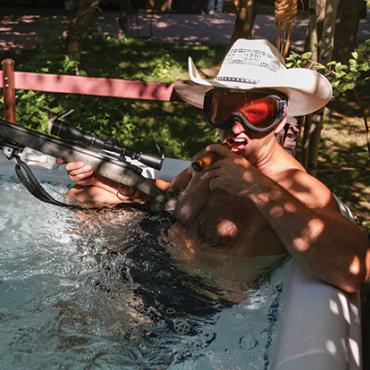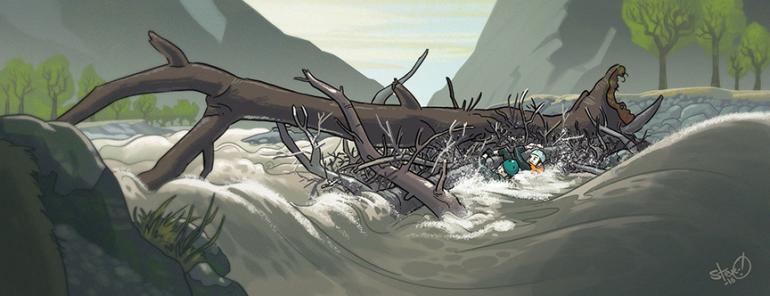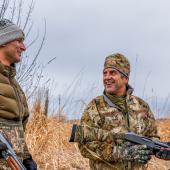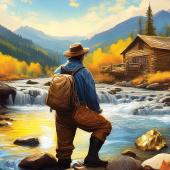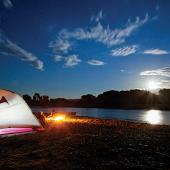True Tales: Flood-Stage Fiasco
Near-drowning on the East Gallatin.
Great rewards come with great risk. Throughout history, this maxim has inspired noble action, fueled courage in the face of danger, and rationalized some really stupid behavior. Which one applies to our calamitous canoe-trip on a fateful spring day in 2014 depends on perspective. My friend Jerrad’s wife Andi, for example, probably sees it differently than I do.
Things started out great. Like the year prior, three of us met up for an afternoon paddle down the East Gallatin River—that shallow, meandering rivulet that, for most of the year, is utterly unworthy of its “river” designation. For a few brief weeks each spring, however, the E. Gallatin surges with snowmelt and transforms into a mighty torrent, offering an exciting ride for those willing to explore its serpentine and sweeper-laden length.
I’d made the call to Jerrad after riding my bike through four inches of water on the E. Gallatin Recreation Area trails, where the river had overflowed its banks. I’d never seen it so high. Jerrad, always game for adventure, showed up with his co-worker Greg; they’d ride the tandem while I went solo.
A quick scouting mission revealed numerous obstacles: downed trees and driftwood piling up into crazy U-turn sweepers and strainers choked with brush. But we’d run the river last year and felt like we understood its challenges. Still, no dogs allowed—the river roared and we had to be on our game.
Off we went, under the bridge at L Street and into a rush of choppy water. Getting our balance, we ducked overhanging branches and practiced our paddlestrokes. Andi and the kids waved to us from the E. Griffin bridge; I caught a look and promised not to kill her husband. “Don’t worry, I beefed up his life-insurance policy,” she said with a wink, evoking a nervous chuckle from Jerrad.
We passed under the N. Rouse bridge, into a swath of rapids and cottonwood pour-overs. Negotiating the obstacles without incident, Jerrad and Greg issued a triumphant whoop—and then promptly dumped the canoe. Our six-pack went bobbing downriver as they hauled the boat ashore. It was a good eye-opener, a reminder to pay attention. At flood stage, the river doesn’t abide mistakes.
Back into the fray we went, skirting logjams and spinning through sharp bends. The water ran much faster than the year before, when we’d been able to relax and enjoy the views. A moment’s inattention put the canoe sideways and one’s face in the bushes—and into the spider webs within.
After a few portages around enormous downed trees, we passed through the Bridger Creek golf course and under Manley Road. Halfway there, and nothing lost but a few beers.
Into the Jaws of Death
The long, uneventful snake around the Cherry River ponds gave us encouragement. It was getting easier. We slipped in behind a string of houses off the Frontage Road, feeling strong.
As we entered a straightaway with a blind turn at the end, a man on the bank waved at us. “There’s a big strainer up ahead on the right!” he cried over the rush of water. “It’s a nasty one—stay left!” I paddled toward the left bank as he repeated his warning: “STAY LEFT!”
The bend was upon us; I stroked hard and spun a 180 in the inside corner, eddying out in a shallow pocket opposite the strainer. I looked up in time to notice two things: 1) the guy was right, it was a nasty one; and 2) Jerrad and Greg were heading right for it.
Their canoe T-boned the fallen cottonwood and for a moment—a surreal, gut-wrenching moment—time stood still. We all held our breaths as Fortuna made her choice. Then, in an instant, the canoe spun sideways and they were down, submerged to the armpits and holding on for dear life. Beyond the snag were two more clumps of brush and tree limbs, with a few feet of open water between them. Jerrad looked at Greg and yelled over the roaring surge, “Don’t you fucking let go! We will not make it through that!”
I grabbed my throw-rope and ran to the closest point just as Jerrad’s own hold broke loose. He vanished into the deluge. “Jerrad’s down!” Greg screamed, and we both went stiff with terror. Three strainers in a row, amid a raging current—he was a goner.
Disaster calls for decisive action, and swift response often supplants good judgement—which explains my thought process as I pictured my friend pinned against a submerged log, seconds away from asphyxiation. “Greg!” I cried. “Catch this rope, I’m going in after him!”
“What?” Greg croaked, incredulous. As I relayed the instructions—that I’d tie one end to my leg and he could sweep me into the strainer sideways—a head popped up on the far bank. Water running down his face, pale skin contrasted with black hair above, Jerrad stared at me with golf-ball eyes. “He’s up!” I yelled to Greg, relief and joy flooding through me. I looked back at Jerrad. “You okay?”
“I think so,” he said, surveying the scratches on his arms and legs. “A little banged up, though.” And then, between gasps: “Shit, I lost a shoe. The current ripped it off." He scowled and shook his head. "What the hell am I going to do now, with one shoe?”
By this time Greg had clambered onto the cottonwood and made the far bank. The canoe, swamped and pinned against the strainer, went under. Sixteen feet of wood and plastic, consumed by the roiling river. A minute later, like its human predecessor, it popped up behind the last snag.
Greg and Jerrad worked the boat free while I recovered various items spilling out of it, then paddled across for a celebration. It was a close one; everyone was shaky but energized from the experience. “Let’s get the hell off this river,” Greg suggested, and we carefully paddled the remaining mile to the takeout on Springhill Road. When we finally hit dry land, we took stock of our losses: sunglasses, paddles, a throw-rope: a good $500 sacrificed to the river, plus the incalculable hit to our egos. Jerrad echoed my thoughts exactly: “Let’s go get a drink.”
The Take-Away
Running rivers is risky business; every good paddler knows it and chooses to accept those risks. But like avalanches and backcountry skiing, there are ways to mitigate the danger. We should have scouted better, and we should have had a rescue plan in place. Our successful float the year before had resulted in a sense of complacency that almost cost Jerrad his life.
“No man ever steps in the same river twice,” asserted Heraclitus, “for it’s not the same river and he’s not the same man.” It’s true: each season the river is unique. It is re-shaped and reborn. And after that run on a deceptively dangerous E. Gallatin, we were definitely changed men.

